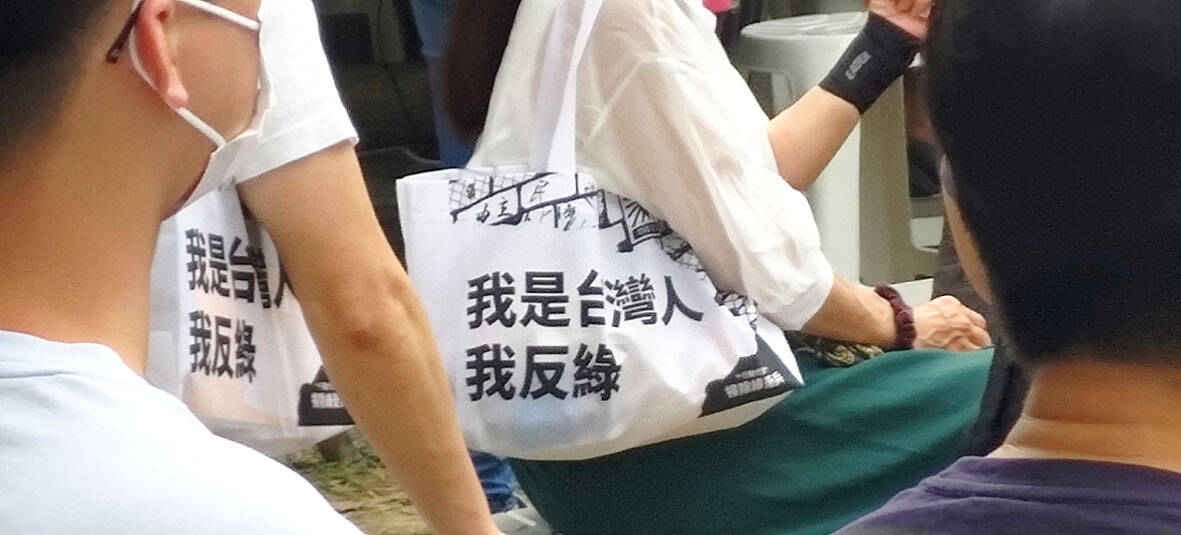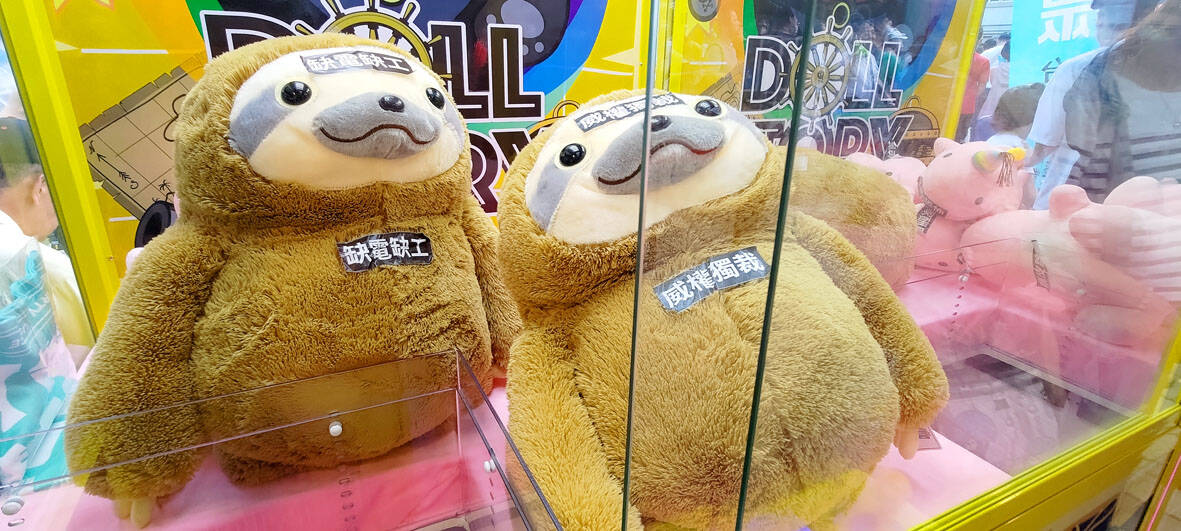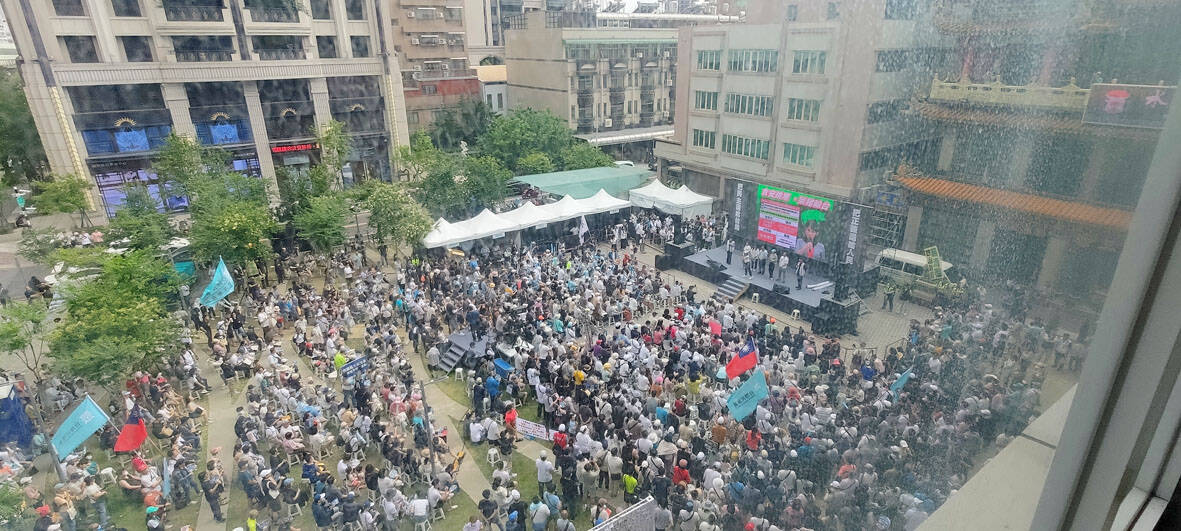The Taiwan People’s Party (TPP) on May 18 held a rally in Taichung to mark the anniversary of President William Lai’s (賴清德) inauguration on May 20. The title of the rally could be loosely translated to “May 18 recall fraudulent goods” (518退貨ㄌㄨㄚˋ!).
Unlike in English, where the terms are the same, “recall” (退貨) in this context refers to product recalls due to damaged, defective or fraudulent merchandise, not the political recalls (罷免) currently dominating the headlines.
I attended the rally to determine if the impression was correct that the TPP under party Chairman Huang Kuo-Chang (黃國昌) had little of a vision or platform that distinguished the party from the Chinese Nationalist Party (KMT), and was largely devoted to attacking President Lai and the Democratic Progressive Party (DPP). The impression was correct; the speeches and ideas presented could have been lifted from the KMT’s Web site and marketing.

Photo: Courtney Donovan Smith, Taipei Times
Much of this is explored in this column on May 28, “Huang Kuo-chang’s choking the life out of the TPP.” The vision that had animated party founder and 2024 presidential candidate Ko Wen-je (柯文哲) of being allied with the KMT, but retaining some key distinct differences and independence, is over in the Huang era.
Beyond confirming this, seeing the TPP in action was a worthwhile experience.
OUTSIDE THE CELESTIAL KINGDOM

Photo: Courtney Donovan Smith, Taipei Times
Political rallies, aside from a few key presidential ones, are different in Taichung than Taipei. If this rally had been held in Taipei, they would have spared no expense to drive a big crowd and put on a huge spectacle of passion and frenzy.
All the national media, the television talk shows and international press are headquartered in Taipei. Unless assigned to a presidential campaign, these Taipei-based journalists consider any place across the Tamsui River irrelevant.
At this Taichung rally, there were no satellite trucks or journalists covering the event. Only two very bored-looking guys sat in the dedicated media tent, despite Taichung being the nation’s second-largest city. They might have been catching up on sleep.

Photo: Courtney Donovan Smith, Taipei Times
Though people briefly passed by from the MRT station next door or the large Shui An Temple that formed the backdrop to the rally, excluding party members and volunteers and the police, there were roughly three or four hundred dedicated audience members.
It was a predominantly middle-aged crowd, and it appeared that retirees easily outnumbered those under age 30. This is not to suggest that polling showing TPP support higher among younger voters is not accurate, only that the younger high-tech workers in Taichung who backed the party work overtime hours and students often are studying out of town.
SUCH A PLEASANT DAY

Photo: Courtney Donovan Smith, Taipei Times
The crowd was friendly, polite and thoughtfully considerate to each other as they calmly gathered to resist Lai’s so-called dictatorial regime hell bent on destroying democracy and weaponizing the judiciary to lock up all opposition and return the nation to martial law. Other than some brief light rain, it was a pleasant day to listen to people on stage tell us tyranny and repression were on the march.
The organizers had thoughtfully prepared pre-printed sticky notes and markers for people to write in why they thought the president should be recalled, and a wall for them to stick them up on. It was popular, and the wall was quickly filled up.
Comments ranged from simple to very detailed about how awful the president is, as well as protestations that Ko is innocent and should be released, though that he is detained on alleged corruption charges was not mentioned. Judging by the comments, Lai is a “big liar,” “trash,” a “dictator” and many other things, including one post that simply said in English in large letters, “Bad.”
Many featured clever puns and plays on words that Taiwanese do so well. I had to laugh when I saw one note lamenting “I would also love to go to Finland,” undoubtedly referring to the Lai administration choosing heavy metal star and former lawmaker Freddy Lim (林昶佐) as representative to the Scandinavian nation.
A couple of children were having trouble finding an open spot to put their sticky notes up on the wall, so I helpfully pointed out some spots for them. Other adults kindly moved to make space for them, and their parents smiled and nodded thankfully that their children could also join in pouring out vitriol at the president. The children looked proud to be participating alongside the adults.
Perhaps also to make the event feel more child-friendly, there were a few claw machines with big, adorable stuffed bears in them bearing apocalyptic stickers about dictatorship and saying that electricity shortages will lead to job shortages. Some were enthusiastically playing the machines, but it appeared that the cuddly-looking bears predicting doom were too big for the machines to handle.
Seeming anachronistically optimistic in the Huang era, some in the crowd wore the cute “little sprout” headbands symbolizing a new future from the last presidential campaign, while a couple of people carried around old campaign balloons for Ko’s presidential run featuring his face and the words “rational, scientific, pragmatic.” Those Ko-era sentiments were not echoed from the stage.
Though Republic of China (ROC) flags were present, there were far less than at a KMT rally, marking one difference between the supporters of the two parties. Bags reading “I am Taiwanese, I oppose (the pan-) greens” had been dispersed, and many proudly carried.
ANYTHING BUT FRENZIED
The entire spectacle was surreal. From the stage, the language was of existential crisis and the crowd would respond as they do at rallies with affirmations and waving their signs warning of dictatorship and resisting fascism, and responded enthusiastically when Huang personally spoke.
Yet, the entire thing felt more like a picnic than a call to rise up in resistance.
In this part of the country, hundreds often come out to protest plans for projects like crematoriums or stray animal compounds, at times violently. Those protests have an urgency and real anger.
This crowd did not feel particularly angry or concerned in any immediate sense. Clearly, they must believe some of what the protest was about, or they would not have shown up — but the sense was of something remote and hypothetical.
They might be able to raise the crowd into something resembling a frenzy in Taipei, but this Taichung crowd was anything but frenzied.
Donovan’s Deep Dives is a regular column by Courtney Donovan Smith (石東文) who writes in-depth analysis on everything about Taiwan’s political scene and geopolitics. Donovan is also the central Taiwan correspondent at ICRT FM100 Radio News, co-publisher of Compass Magazine, co-founder Taiwan Report (report.tw) and former chair of the Taichung American Chamber of Commerce. Follow him on X: @donovan_smith.

Taiwan has next to no political engagement in Myanmar, either with the ruling military junta nor the dozens of armed groups who’ve in the last five years taken over around two-thirds of the nation’s territory in a sprawling, patchwork civil war. But early last month, the leader of one relatively minor Burmese revolutionary faction, General Nerdah Bomya, who is also an alleged war criminal, made a low key visit to Taipei, where he met with a member of President William Lai’s (賴清德) staff, a retired Taiwanese military official and several academics. “I feel like Taiwan is a good example of

March 2 to March 8 Gunfire rang out along the shore of the frontline island of Lieyu (烈嶼) on a foggy afternoon on March 7, 1987. By the time it was over, about 20 unarmed Vietnamese refugees — men, women, elderly and children — were dead. They were hastily buried, followed by decades of silence. Months later, opposition politicians and journalists tried to uncover what had happened, but conflicting accounts only deepened the confusion. One version suggested that government troops had mistakenly killed their own operatives attempting to return home from Vietnam. The military maintained that the

Before the last section of the round-the-island railway was electrified, one old blue train still chugged back and forth between Pingtung County’s Fangliao (枋寮) and Taitung (台東) stations once a day. It was so slow, was so hot (it had no air conditioning) and covered such a short distance, that the low fare still failed to attract many riders. This relic of the past was finally retired when the South Link Line was fully electrified on Dec. 23, 2020. A wave of nostalgia surrounded the termination of the Ordinary Train service, as these train carriages had been in use for decades

Lori Sepich smoked for years and sometimes skipped taking her blood pressure medicine. But she never thought she’d have a heart attack. The possibility “just wasn’t registering with me,” said the 64-year-old from Memphis, Tennessee, who suffered two of them 13 years apart. She’s far from alone. More than 60 million women in the US live with cardiovascular disease, which includes heart disease as well as stroke, heart failure and atrial fibrillation. And despite the myth that heart attacks mostly strike men, women are vulnerable too. Overall in the US, 1 in 5 women dies of cardiovascular disease each year, 37,000 of them